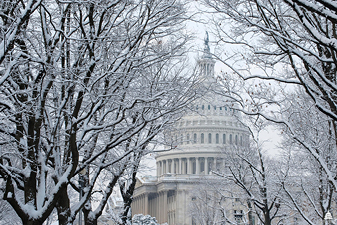|
By Cecile Entleitner, Associate, Blakey & Agnew
The month of December offers a timely opportunity to review this year's accomplishments and challenges, while also allowing for a look ahead to what next year might bring. As Congress gets ready to celebrate the holidays and close out the year, there are a few transportation-related items left on many legislators' wish lists.
While December is generally associated with New Year's resolutions, Congress has been preoccupied with continuing resolutions (CR). Lawmakers have been unable to agree on a full-year appropriations package for fiscal year 2020, opting for stopgap measures known as CRs instead. CRs usually do not allow for funding increases or appropriations for new programs, but rather provide federal agencies short-term extensions of current funding levels (in this case fiscal year 2019 enacted levels). The second CR of this fiscal year was signed by President Trump on November 21, 2019, just hours before the previous CR was set to expire. Although a government shutdown was averted for the time being, Congress now needs to either pass a full-year funding bill or an additional CR before its next deadline on December 20. As Congress only has eight scheduled days in session remaining this calendar year, this is sure to be a top priority in the coming weeks.
Although FY20 funding is still unresolved, the CR did provide one early holiday gift to state departments of transportation. The legislation included a provision repealing the $7.6 billion rescission in Highway Trust Fund contract authority. The rescission, mandated by the 2015 Fixing America's Surface Transportation (FAST) Act, was scheduled to take effect on July 1, 2020. Transportation stakeholders and several Members of Congress had been advocating for the rescission to be repealed for some time. These calls became increasingly urgent when the Federal Highway Administration in November released data showing the unobligated highway funding balances per state subject to rescission. Unobligated state balances totaled nearly $5.4 billion, meaning an additional $2.2 billion cut to funding already obligated to current transportation projects would have been necessary to fulfill the rescission requirement. By eliminating the rescission, states are now able to meet their commitments to existing projects and continue to invest in future infrastructure improvements.
Despite the importance of these funding measures, some might consider them stocking stuffers compared to this next big-ticket item: surface transportation reauthorization. With the current
|

authorization (the FAST Act) expiring on September 30, 2020, stakeholders are anxiously awaiting details on its successor. The Senate Environment and Public Works (EPW) Committee made an early start in developing a reauthorization proposal. In July the Committee approved America's Transportation Infrastructure Act of 2019, the bill would provide $294 billion in total funding over five years. The proposal contains several provisions that impact the goods movement industry. It provides funding increases for the National Highway Freight Program (the freight formula program created by the FAST Act) and INFRA discretionary grant program, and also raises the cap on funds eligible for multimodal projects to 30 percent of available funding for both programs. Additionally, the proposed legislation would authorize several new programs, such as bridge investment grants, a grant program for emission reductions at port facilities, and a road-usage fee pilot program.
The approval of this bill was an important first step toward reauthorization, however, other congressional committees with jurisdiction over surface transportation have yet to weigh in with their additions. These include safety, rail, and transit provisions, as well as funding mechanisms. The House of Representatives is working on their own proposal, which they reportedly plan to introduce early next year. Currently, not much information is available on the specifics of the House reauthorization plan, but Transportation and Infrastructure Committee Chairman Peter DeFazio (D-OR) has indicated it will emphasize climate resilient policy measures and emerging technologies.
When the clock strikes midnight on New Year's Eve, the 2020 countdown for policymakers will have only just begun. With the presidential election cycle, trade negotiations, and impeachment proceedings sure to dominate next year's headlines, our hopes remain high that 2020 could be a big year for transportation.
Blakey & Agnew, LLC is a public affairs and
communications consulting firm based in
Washington, DC.
|



